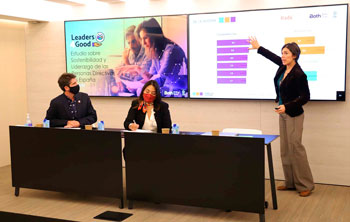Leaders4Good: 1st Study on Sustainability and Leadership of Managers in Spain
 Only 30% of managers achieve a level of maturity in sustainability, according to the 1st Study on Sustainability and Leadership of Managers in Spain, led by EADA Business School and the Both.People&Comms agency. The research, which was co-led by professors from EADA Business School, Ferran Velasco, Federica Massa Saluzzo and Davide Luzzini, proposes a maturity index and identifies which competencies are the most decisive when carrying out the role of manager.
Only 30% of managers achieve a level of maturity in sustainability, according to the 1st Study on Sustainability and Leadership of Managers in Spain, led by EADA Business School and the Both.People&Comms agency. The research, which was co-led by professors from EADA Business School, Ferran Velasco, Federica Massa Saluzzo and Davide Luzzini, proposes a maturity index and identifies which competencies are the most decisive when carrying out the role of manager.
Analysis of the collected data confirms that managers who achieve a high score in terms of sustainable behaviour and can therefore considered to be mature, not only possess an awareness of sustainability but have also mastered three key competencies: empathy, leadership and execution. According to the Director of the study, Dr. Federica Massa Saluzzo “when we talk about maturity, we refer to how people, through their actions and decisions, promote the preservation of the environment, improve the well-being of all stakeholders and encourage this type of behaviour among members of staff and within the organisation.”
Four types of profile
Mature leaders are mostly found to hold senior management positions, have a higher level of education and tend to work in large companies. This group is made up of 53% women and 47% men. At the other end of the scale are the immature leaders, which make up 34% of the total data sample. Immaturity is based on being poorly motivated by social and environmental issues. This type of profile also scores lower on empathy, leadership and execution. Men account for 67% of this group.
26% of the sample are categorised as competent but disengaged. These include managers who have the necessary competencies but do not have the same level of sustainability awareness. The remaining 10%, who have been categorised by the authors of the study as enthusiastic beginners, are concerned about sustainability but do not reach a high level of competency. They are generally younger and work in smaller companies.
Organisational support
 In addition to motivation and competencies, the study concludes that organisational support has a direct effect. According to EADA professor Federica Massa Saluzzo “it goes further: when these three factors coincide, they have a determining effect on the degree of maturity, which excludes all the control variables such as age, gender, size of the company or the position held.”
In addition to motivation and competencies, the study concludes that organisational support has a direct effect. According to EADA professor Federica Massa Saluzzo “it goes further: when these three factors coincide, they have a determining effect on the degree of maturity, which excludes all the control variables such as age, gender, size of the company or the position held.”
Marcela Ospina, Director of the Purpose and Sustainability Area of the communication consulting firm Both.People & Comms, underlines the importance of carrying out studies such as this one since “it enables us to find out what support we can offer managers for them to be able to lead the change towards sustainability. In fact, contrary to what some managers may think, social and environmental responsibility is compatible with economic performance and profitability. Debunking these myths will help to ensure that there are more and more leaders committed to sustainability.”
This study was carried out in collaboration with B-Lab, a non-profit organisation that is part of B-Corp, the global certifying organisation for B-Corp companies.
